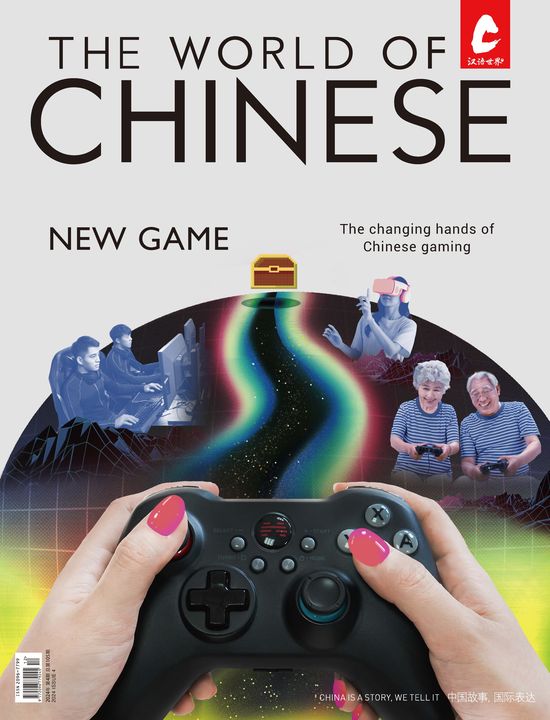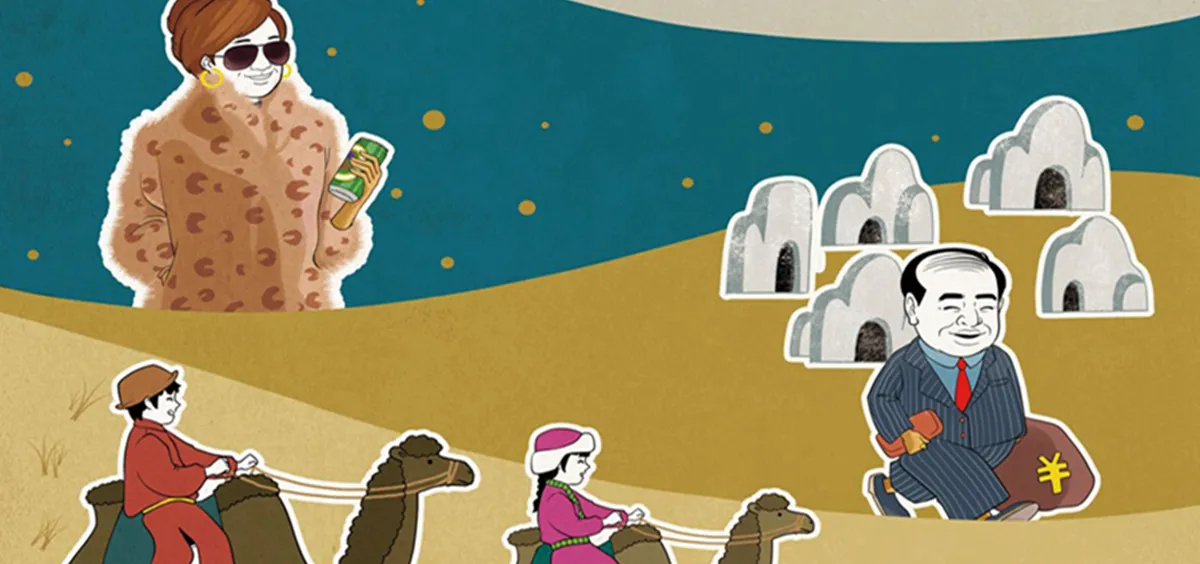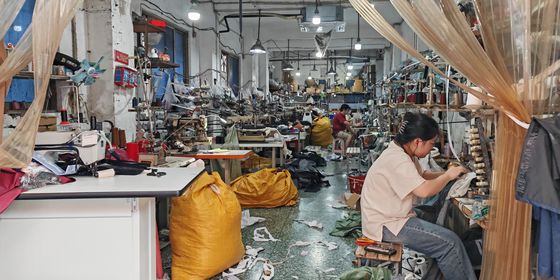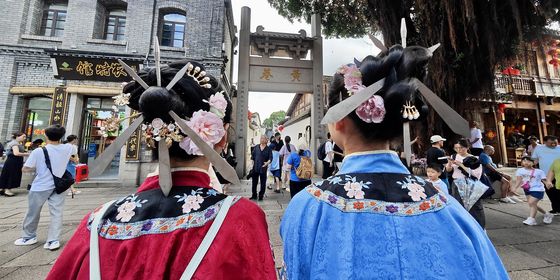Turning the tables on regional stereotypes and bias
Where are you from?” can be a dangerous question. From the crafty image of coastal Southerners to Northerners’ reputation as yokels, social interaction in China is rampant with regional prejudice.
The habit of stereotyping people by geography is called “地域黑” (dìyùhēi, regional slander) or more evocatively, “地图炮” (dìtúpào, map cannon). Whether food or clothing, housing, and traveling habits, no aspect of life is out of range for the bigot brigade. But rather than arguing or reasoning with their slanderers, some people have found 自黑 (zìhēi, self-slander) to be an effective and humorous weapon against bias.
Take Guangdong province, whose people are said to consume anything that moves, flies, or swims. Cantonese cuisine incorporates ingredients like organs, chicken feet, duck tongue, frog legs, snake, snail, and even wild or endangered animals—and, if you believe the auto-complete function on Baidu’s search engine, “cats,” “rats” and “human fetuses.”
This stereotype is neither true, nor a compliment. But rather than deny it, Cantonese often add fuel to the fire by invoking another phrase—广东人吃福建人(Guǎngdōngrén chī Fújiànrén, Cantonese people eat Fujianese people). This meme started during the 2017 Spring Festival season, when the following chat thread between a Fujianese and his Cantonese friend went viral:
A: I heard that you Cantonese people…
Tīngshuō nǐmen Guǎngdōngrén……
听说你们广东人……
B: Particularly love to eat Fujianese people.
Tèbié àichī Fújiànrén.
特别爱吃福建人。
Other Cantonese jumped on the bandwagon.
People ask me what’s the most famous dish in Cantonese cuisine; I say, Fujianese people.
Yǒurén wèn wǒ, yuècài lǐ shénme zuì yǒumíng? Wǒ shuō, Fújiànrén.
有人问我,粤菜里什么最有名?我说,福建人。
Once, I went to Fujian, and my mouth couldn’t stop watering!
Wǒ yǒu yī cì qù le Fújiàn, zhēnshi rěnbuzhù liú kǒushuǐ!
我有一次去了福建,真是忍不住流口水!
The edible Fujianese themselves are targets of geographic mockery, thanks to their accent. Influenced by local dialects, the stereotypical Fujian native mixes their f’s as h’s when speaking Mandarin. The Fujianese take it in stride, though, jokingly calling themselves “胡建人” (Hújiànrén, Hujianese):
When we Hujianese laugh, we go “fafafa.”
Wǒmen Hújiànrén xiào qǐlái dōu shì “fā fā fā” de.
我们胡建人笑起来都是“发发发”的。
People from Dongbei (“northeast”), shorthand for the provinces of Liaoning, Jilin, and Heilongjiang, are considered uncouth barbarians. Their eating habits are deemed unhealthy—barbecue meat for every meal—and fashion sense restricted to furs and gold chains. You may want to keep your mouth shut about all that, though, as a wrong remark or askance look could spark a fight with the reputedly violent Dongbei native. But one aspect of northeasterners is grudgingly admired by other Chinese: their alcohol tolerance. When dinner guests from other regions are already flat on their face, those from the north may find their baijiu cups being topped up:
You are from Dongbei, you must be good at drinking!
Nǐ shì Dōngběirén, kěndìng hěn néng hē!
你是东北人,肯定很能喝!
What should a poor Dongbei non-drinker do? Use another stereotype as a shield:
I don’t dare get drunk, or my wife will beat me to death.
Wǒ kě bù gǎn hē duō, yàobùrán wǒ lǎopo huì dǎ sǐ wǒ.
我可不敢喝多,要不然我老婆会打死我。
Similar views are directed at Inner Mongolia, romanticized as a vast grassland populated by nomads. Residents sick of explaining their housing conditions (apartments), means of transport (not horseback), and economy (quite modern) to outsiders would rather say:
I have lived in a yurt since I was a kid, and never seen a building; I ride a horse to school every day, grazing milk cows on the way; if I run out of money, I knit sweaters to sell.
Wǒ cóngxiǎo zhù ménggǔbāo, méi jiànguò lóufáng; měitiān shàngxué dōu shì qímǎ qù, shùnbiàn fàng yíxià nǎiniú; yàoshi méi qián le, jiù zhī diǎnr yángmáoshān qù mài.
我从小住蒙古包,没见过楼房;每天上学都是骑马去,顺便放一下奶牛;要是没钱了,就织点儿羊毛衫去卖。
People in Gansu may sympathize; their province is typically imagined as a barren, lifeless desert. Their rejoinder?
That’s right. We bathe only once a year, and our only means of transport is the camel.
Méi cuò, wǒmen yì nián zhǐ xǐ yí cì zǎo, wéiyī de jiāotōng gōngjù shì luòtuo.
没错,我们一年只洗一次澡,唯一的交通工具是骆驼。
Not far off, the northwestern province Shanxi is one of the cradles of Chinese civilization. However, Shanxi is also known for its rich coal deposits, which has made the fortune of many a crooked “煤老板” (méilǎobǎn, mine boss). According to stereotype, these vulgar, poorly educated nouveau riche have a penchant for buying luxury handbags, and cause all Shanxi folks to be asked: “你家里有矿吗?” (Nǐ jiāli yǒu kuàng ma? Does your family own a coal mine? ) Here’s an effective reply:
Too many! Even the wind in our backyard is black!
Nà kě tài duō le! Wǒmen jiā lián hòuyuàn de fēng dōu shì hēi de!
那可太多了!我们家连后院的风都是黑的!
By contrast, Wenzhou, Zhejiang province, is believed to be filled with wealthy entrepreneurs. The people there are known as self-starters and envelope-pushers, but are also blamed for over-speculation and driving up real estate prices. Faced with accusing glares from those who can’t afford to buy a house, what’s a Wenzhou native to do? Why, humblebrag, of course:
We the people of Wenzhou have decided to take half the responsibility for the nation’s skyrocketing housing prices.
Wǒmen Wēnzhōurén juédìng wèi quánguó fángjià shàngzhǎng fù yíbàn zérèn.
我们温州人决定为全国房价上涨负一半责任。
Still, arguably the most maligned province of China is none of the above: step forward, Henan. Its natives once had a reputation for being “honest, frank and rule-abiding,” at least according to an academic survey in the 1960s.
But within three decades, a series of health and other scandals had badly damaged the populous province’s reputation; in addition, agricultural Henan has had an unusually high proportion of internal migrants, earning the easy scorn of urbanites all over China. For some reason, the theft of manhole covers is associated with the Henanese, who might self-deprecatingly claim:
The manhole cover is our provincial currency. When we turn 18, we need to steal 18 covers, or we aren’t considered adults.
Jǐnggài shì wǒmen shěng de liútōng huòbì. Wǒmen shíbā suì de shíhou děi tōu shíbā gè jǐnggài, yàobùrán bù suàn chéngnián.
井盖是我们省的流通货币。我们十八岁的时候得偷十八个井盖,要不然不算成年。
It’s in southwestern Yunnan, though, that out-of-towners might surreptitiously approach the locals about another’ “currency”:
Is it really easy to buy drugs in your hometown?
Zài nǐmen jiā nar mǎi dúpǐn zhēnde hěn róngyì ma?
在你们家那儿买毒品真的很容易吗?
It’s not only smugglers and cartel kings who live near the “Golden Triangle,” but others don’t have to know that:
Of course, you can even order it for take out!
Dāngrān, hái kěyǐ jiào wàimài ne!
当然,还可以叫外卖呢!
It almost appears that no province is without flaw, but at least we’re all as good or bad as one other. Next time you’re asked “Where are you from?” maybe just put down your copy of Walden, and mutter:
I make my home wherever I am.
Wǒ sìhǎi wéi jiā.
我四海为家。
Pride in Prejudice is a story from our issue, “The Noughty Nineties.” To read the entire issue, become a subscriber and receive the full magazine.












